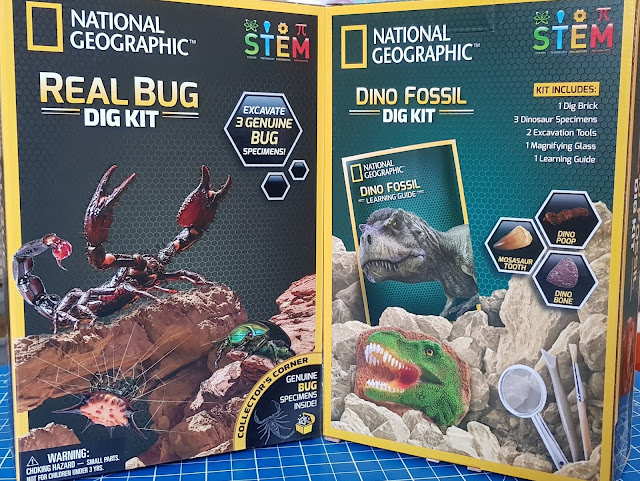Any regular readers will probably be well aware that I'm no stranger to the National Geographic STEM activity sets. I love them and so do all of my family. I can't tell you how many of these sets we've bought and completed over the years with all of our children, but it's easily 50. They're a brilliant tool to get kids thinking about their world from a different angle, and they teach us all so much.
The Dino Fossil Dig Kit is similar to some we've had in the past, but it's been updated and now includes genuine coprolites - fossilised dinosaur poo! Inside the box are a plaster brick to dig into, digging and cleaning tools, a magnifying glass and a really nicely written learning guide booklet.
The plaster brick contains 3 different genuine dinosaur fossil specimens - a dino bone, a mosasaur tooth and a dino poop. Digging them out can take a little while, although my well-practised boys were on it and all 3 fossils were out within 20 minutes.
It's impressive. My 10 year old is convinced the poop is staining things brown, but clearly that's actually impossible as it's now made of rock. The Mosasaur tooth is a good size and very different to previous dinosaur teeth we've seen, it's chunkier and more intimidating.
Doing a kit like this opens up a whole area to explore and we've all learnt exactly what a Mosasaur is now. They were carnivorous aquatic lizards and you can even see one feeding in the water in the Jurassic World movie.
The Real Bug Dig Kit is brand new. Excitingly it doesn't have a big plastic tray, it has a cardboard one which you can use to keep all of your mess neat and tidy and then recycle afterwards - awesome.
The tools remain the same and you really don't need anything else. A digging tool, brush and magnifying glass. We were interested to find out how the bugs in the kit could be safe from the digging, we discovered the answer very quickly. The images on the top of the bricks are purely decorative by the way - dig away!
Each of the 3 tiny bug specimens in the plaster brick are encased in a bead of acrylic to protect them. It works really well. Inside there are a Spiny Spider, a Fortune Beetle and a Scorpion. Our beetle was upside down at first, but it gave us a chance to examine his belly.
It would be remiss if I didn't mention these are real creatures, encased in plastic for our amusement. I have a little problem with that personally, but they are bred especially and not just kidnapped from the wild. They are beautiful and being able to examine them so closely and easily is a brilliant learning experience for children.
The accompanying booklets are packed with information about the specimens and where they are from, how they came about, habitats and who they lived alongside. It's presented in a really easy-to-read format which is very accessible to children and interesting to grown ups!
I'd like to see them add in UK specific information though. We have looooooooooads of dinosaur findings of our own! And you can go and see some of our dinosaur fossils for yourself in situ, in under 6 hours wherever you are in the UK...
We love these kits and the boys really are very pleased with the new Bug Dig Kit. It's very different, and the way the bugs are presented makes them incredibly collectible and easy to study. The addition of poop to the Dino Dig Kit will always be popular with 8 and 10 year olds and frankly it's fascinating even to me.
The full range of Bandai National Geographic STEM kits are available to buy, although the new bug kit is only just coming into stores now. They're mostly suitable for age 8+ and prices are very reasonable, around £10-£15 per kit with genuine specimens and an insight into how the professionals do it! You can find them in stores including the Dino Dig Kit for £10 at Argos and online, including Amazon. (Prices correct at time of typing).
You can find more National Geographic STEM kit reviews at PinkOddy and ET Speaks From Home.
We were sent our STEM dig kits for review from Bandai.














ooh those look a lot of fun. What a fab toy x
ReplyDeleteThey are excellent. There's nothing quite like that moment you reveal what you have discovered in the plaster brick :D
DeleteOh I love that I learnt even more from your review too - we are at the having lots of fun stage.
ReplyDelete:D I love it when I learn something new from a children's toy or book - it lets you know that thought has been put into it and it isn't 'dumbed down' for kids. It was great that the boys wanted to Google Mosasaur and find out about them too - a definite win.
DeleteI told you graphic it's just fun to dig stuff up and learn new stuff and learn new creatures and gems and fossils I just love National Geographic I'll always buy the boxes and I got it too I got a lot of National Geographic gems and fossils.
ReplyDeleteGlad they have another fan! They are excellent kits :)
Deleteok
ReplyDelete